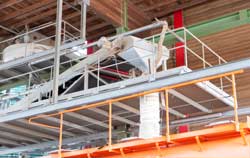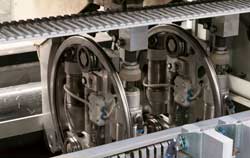




Memory for 750 measured values / graphic display / easy operation / multilingual menu / measurement in Hz and N
The belt tension meter is an optically measuring maintenance tool for determining the belt tension force. This belt tension meter consists of a display device and a sensor head attached on a semi-flexible gooseneck. The advantage of the gooseneck is that the sensor head can be flexibly positioned. Due to the mobility of the gooseneck, the sensor can measure the strand force even in hard to reach places. The belt tension measuring device measures the belt tension (in Newton) and the belt frequency (in Hz) of the belt in the stationary state.
A small impulse on the belt is sufficient to set the belt vibrating. The belt tension meter measures with the sensor the natural frequency of the belt generated in this way and visualizes it on the display. The belt tension meter can directly determine the actual tension (in Newton / Pound Force) of the belt from the belt frequency combined with the optionally entered belt length and belt mass. However, entering this data is not necessarily required in order to carry out the measurements directly with the belt tension measuring device. The measurement units in the device can be switched between N (SI unit) and pound force (US unit).
The reading is always shown as the belt frequency in Hz on the display of the belt tension measuring device. The intuitive graphic menu is visualized on the high-contrast display of the belt tension measuring device in six different languages. Up to 750 data records can be stored in the memory of the belt tension measuring device. The belt tension measuring device is delivered completely ready for use. The scope of delivery includes the handheld device, the standard sensor with gooseneck, a magnetic holder, batteries and operating manual. To increase the flexibility during the measurement, the following items are optionally available to the belt tension meter: an external sensor head with a spiral cable, a device hard case, a frequency mallet and a tripod.
The belt tension measuring device can measure the belt tension of timing belts, ribbed belts and V-belts. 
Principally here applies, the greater the forces to be transmitted and the greater the belt speed during operation, the greater the preload forces that must be selected. At the same time, it is necessary to ensure that the belt tension is not set too high, since otherwise the bearings of the belt drives can be affected and, at the same time, the belt-wear increases which may cause belt cracks. At the same time, too low belt tension can also cause damage when, for example, teeth skipping or the belt slipping occurs. Because of that it is important to determine the belt tension or the preload force with a belt tension measuring device. This may help to significantly reduce the follow-up costs occurring due to the unplanned standstill and downtime caused by the bearing damage or by the defective belts. The use of a belt tension measuring device is therefore suitable for applications in the field of industrial production, motor technology, for stepper motors, in machine and tool construction or also in the area of maintenance and repair.
Since several forces act on a belt drive, the most important forces on belt drives are named below in order to understand the significance of the belt tension force. The belt connects a drive pulley with a driven pulley. The drive pulley is driven by a motor which generates a torque and transmits it to the drive pulley. The belt transmits this torque in the form of a circumferential force to the driven pulley. The following forces are important.
The circumferential force: The circumferential force corresponds to the effective force to be transmitted by the belt. The circumferential force depends on the applied engine power and thus on the torque as well as on the engine speed and the pulley diameter. In order to maintain the balance of forces, the circumferential force causes the formation of different forces in the strands of the belt. The difference between the forces between the loaded and unloaded runs corresponds to the circumferential force transmitted to the belt.
The frictional force: The frictional force at the drive pulley ensures that the torque of the motor is transmitted via the belt to the driven pulley. At the driven pulley, a usable torque is generated which corresponds to the product of the circumferential force and half the diameter of the driven pulley.
The centrifugal force. The centrifugal force increases with increasing speeds and causes the belt to stretch and thus lose grip. In this case, the centrifugal force acts against the adhesion force.
The pretensioning force: The pretensioning force / span force / belt tension is different under dynamic conditions on the loaded and the unloaded span. In static conditions, the belt tension is identical in both runs. In the static state, the pretensioning force must be set in such a way that under dynamic conditions there is sufficient adhesion to the pulleys to ensure the transmission of power from the belt to the pulley, while at the same time taking into account the centrifugal forces acting on the belt in the operating state. However, the belt tension must not be set too high, as otherwise belt damage and/or bearing damage may occur under load. The correct belt tension must be selected specifically for each belt and the corresponding application. In most cases, belt manufacturers specify the corresponding belt tension in the form of forces or frequencies. A belt tension meter can then be used to accurately determine the required belt tension after installation and before commissioning a belt drive.
The measurement of the belt tension is always necessary when machines and systems are to be optimally maintained. A belt drive reaches its maximum service life only if it is designed and adjusted for its use. This means that the belt should be tensioned for the specific application optimally and the pulleys – precisely aligned. 
Long service life and high performance of the equipment and the machines – is the wish-goal of every user, either company or an individual. In many industries, in particular, in various mechanisms, belts are an important and necessary part. The smallest deviations from the standards may lead to serious consequences, like systems failure, that is why, it is especially important to regularly check the belt tension, since only when this value is absolutely correct and optimal, the best performance may be provided. Not only weaker than necessary tension, but also the tension that exceeds the standards, may cause serious and, which is important, preliminary, degradation of the belt and drop of the performance. This could cause serious machine failures with unplaned downtime and high repairing costs. For example, wrong belt tension in the generator of the car is devastating in both cases and may be dangerous and lead to the complete wear of the mechanisms. Significant costs – is just one of the items in the list of the possible problems that may follow. Even if the belt is not broken, the change in its function does not remain unimportant for the whole system or mechanism, and that is why it is actually one of the priority tasks to keep this issue under control.
To do this is easy with the help of the belt tension meter, which represents a small, but a very useful device which can help the user to determine the belt tension in the system to be controlled and thus, indicate whether the prompt measures should be taken to adjust the tension to the setpoint value.
Testing the tension manually remained in the past long time ago, and the best way to determine the tension is to use the device and by means of the calculations get an exact data about the belt tension. The vibrations coming from the belt are not only registered by the belt tension meter, the data are processed after they have been received by the optical sensor, and based on the characteristics of the belt (weight, width, length), the final result is calculated and displayed on the lighted screen (in N and Hz).
The spectrum of application is wide, starting from individual applications in household (various devices and household equipment) or office to industrial fields where it can be used for different conveyors, lifting equipment, elevators, automotive industry or agricultural machines.
The main advantage of the belt tension meter is not only that it helps to detect the faults and prevents failures, it may also be used for checking the correctness of the installation before commissioning. Thus, before the equipment gets started, the check by means of the belt tension meter is a reliable confirmation that the machine will run flawlessly in compliance with the regulations. The data received with the help of the meter may be saved and used as a norm-sample during the regular maintenance checks later.
| Measuring range |
10 ... 900 Hz |
| Accuracy | ± (1% of rdg. + 4 digits) |
| Repeatability accuracy |
± 1 Hz |
| Resolution | <100 Hz: 0.1 Hz |
| >100 Hz: 1 Hz | |
| Belt length | max. 9,999 m |
| Belt mass | max. 9,999 kg/m |
| Sensor length | 16 cm / 6,2 in |
| Memory | 750 measured values |
| 15 sets of 50 measuring points | |
| Menu languages | German, English, Spanish, |
| French, Italian, Dutch | |
| Power supply |
3 x 1.5 V AA batteries |
| Operating conditions | 0 ... 50 °C / 32 ... 122 °F; max. 95 % R.H. |
| Storage conditions | -20 ... 65 °C / -4 ... 149 °C; max. 95 % R.H. |
| Dimensions | 150 x 80 x 38 mm / 5.9 x 3.1 x 1.4" |
| Weight | ca. 200 g / 7 oz incl. batteries |